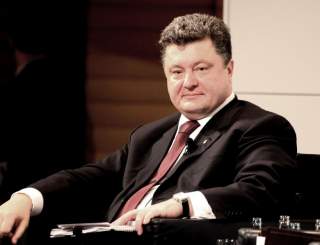Petro Poroshenko's Fatal Flaw
Ukraine's new president has a big problem—he is still ignoring many of the needs and aspirations of eastern Ukraine.
Such a victory would deprive the Other Ukraine of any effective political voice. It would become, essentially, an occupied territory. Popular resistance would be driven underground, spawning a subculture of resentment against “the occupiers” that would haunt Ukrainian politics for decades to come.
The goal ought to be to change the attitude of the Other Ukraine toward Kiev. By increasing civilian casualties and producing thousands of refugees, however, the current military campaign is only creating more hostility toward the rest of Ukraine.
Assuming that President Poroshenko is interested in gaining the loyalty of the Other Ukraine, what might an effective strategy be? First, a cease-fire to be negotiated and monitored, if necessary, by international observers. Second, negotiations on the delegation of powers of local government with anyone who is willing to accept the territorial integrity of Ukraine. There should be no other preconditions.
Finally, once a framework for restoring law and order is agreed to with local leaders, Kiev should then turn local security matters over to the local government and withdraw its military forces. It must trust that the population of the Donbass desires to stay within Ukraine, or be willing to allow it to go its own way. The psychological as well as financial costs of a prolonged military occupation of the region are simply too high to countenance, for they would spell the end of Ukrainian democracy.
Poroshenko’s popularity today is based largely on the expectation that he can reach a modus vivendi with the Other Ukraine. If he fails, it can plummet overnight, as his predecessors know all too well. Therefore, now is the time to boldly reshape policy and attitudes toward the Other Ukraine, and to shift Ukrainian patriotism away from its obsession with language and national identity narrowly defined, toward a civic patriotism that would allow those who cherish their Russian heritage to also be fully recognized as Ukrainians. Nothing would accomplish this better than the president publicly affirming that the Ukrainian nation is and always will be, at its heart, bilingual and bicultural.
I have said nothing about Russia’s or the West’s roles in this crisis. That is because both are marginal players in this drama. The Ukraine crisis has always been, quintessentially, a domestic feud between two visions of Ukrainian identity. Ultimately, Russia can no more divide a united Ukraine, than the West can keep a divided Ukraine together. Finding enough common ground to preserve national unity, however, is something that Ukrainians will have to do for themselves.
Nicolai N. Petro is professor of political science at the University of Rhode Island. He has just finished a year in Odessa as a U.S. Fulbright research scholar in Ukraine. His views do not reflect those of the U.S. Department of State or the Fulbright Program.
Image: Wikimedia Commons/Kathrin Möbius/CC by 3.0-de

